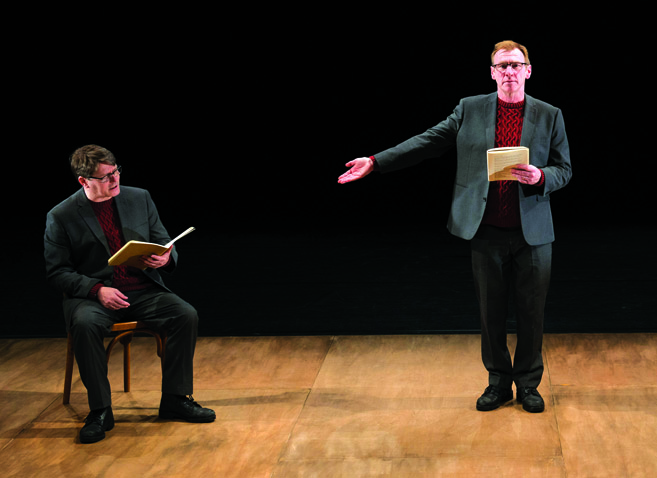This weekend, in the eye of the storm that is IBT15, Forced Entertainment presented their tempestuous The Notebook at Arnolfini in Bristol.
The Notebook is a play which takes its roots from Agota Kristof’s Le Grand Cahier. The book is almost thirty years old – as are Sheffield-based Forced Entertainment. Yet the piece has a cutting, contemporary feel, a naivety in tone and a timeless quality.
The Notebook follows the story of Hungarian twin brothers, separated from their mother and evacuated during World War II. The voices of the two are distinct and indistinguishable from one another. Robin Arthur and Richard Lodown are performing a monologue for one voice; the unnamed twins boys. ‘One and the same person,’ they record their father saying.
Aurthur and Lodown beckon the audience into the twins’ intimate world, where they have their own language, share the same thoughts; where they seem to record everything that happens to them in their notebook; no matter how horrible or painful it might be.
The scenes are broken down into a series of ‘compositions,’ which bluntly and accurately describe their lives, their experiences, but never their feelings. This is a play about survival, brutality and childhood. But it is also a play about narrative and writing. The notebook itself becomes a feature of the story, as the boys describe their decision to record what is happening to them, and set the rules for doing so.
“The composition must be true,” they say. “It is forbidden to write ‘The little town is beautiful,’ because it may be beautiful to some and ugly to others. Beautiful is not a reliable word.”
Emotions, therefore, are banned. Everything is stated, everything is factual and everything is true. But everything is also not quite as it seems. The plays deals with big questions of narrative objectivity, and reliability of voice – it invites one to question these things; to read between the jagged lines. Yes, everything that is written is true. But what about the things which aren’t written?
Time and time again the motif of secrecy and lies is used. The boys deploy trickery and blackmail. They cut keys for themselves, sneak around the house and drills holes in the attic floor to spy on their grandmother. Everybody harbours secrets – poisoning, pregnancies and abuse. ‘The dead ought not to be disturbed,’ says grandmother, who never removes her black shawl, even in bed. And even the boys may not be as wholly reliable as they seem
At first, and often throughout the play, the twins’ childish factual style is a great source of humour, as well as their inability to communicate with other people. “Grandmother is mother’s mother,” they inform us sincerely. As children often do, they also reel off great lists in their composition;
“We smell like a combination of manure, fish, grass, mushrooms, cheese, mud, sweat, clay, faeces, urine – and mould”
What at first strikes you as a childish naivety in style, soon becomes something ugly and brutal. Childhood is stripped away. All feeling is stripped away. Though still present in their retelling, they almost view their own reactions and emotions as separate to themselves (“our faces turned red,” “we vomited.”) there is a dissociation between the feelings they experience, and themselves, and gradually, throughout the story, they deliberately and incidentally become hardened – experiencing more and more confusing and traumatic events – and recording things they do not yet understand.
A beautiful piece of writing, staged simply, using only two chairs and the proximity of the actors in the space. Arthur and Lodown are excellent; bringing gravity, naivety and cheekiness to the boys; working in such perfect tandem that you could almost believe they were one and the same.
For a piece which tries to shun and strip emotion, The Notebook is definitely one of the most affecting and difficult plays I have ever seen. ★★★★☆ Chris White 15/02/15
Photo by Hugo Glendinning
IBT is an international, biennial festival; a weekend full of performance and art hosted and curated by In Between Time, in association with Arnolfini.


